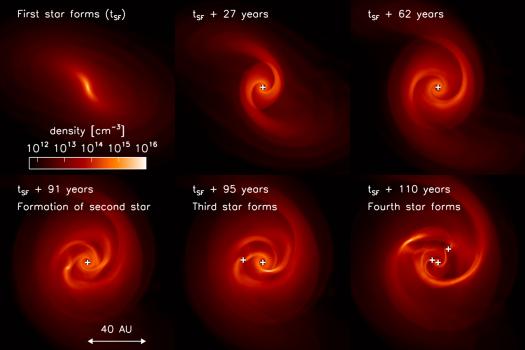Time sequence of the disk evolution around the first star
Time sequence of the disk evolution around the first star. The disk gives rise to spiral density waves, compressing the gas, and thus triggering further fragmentation into additional protostars. Already 110 years after the first protostar formed, three neighboring stars have emerged. The assembly process of the first stars will continue for another 100,000 years or so, at which point a massive double-star will likely have formed, possibly accompanied by a small group of somewhat lower-mass stars. Credit: Clark, Glover, Smith, Greif, Klessen, Bromm (Univ.of Heidelberg, UT Austin); Texas Advanced Computing Center






